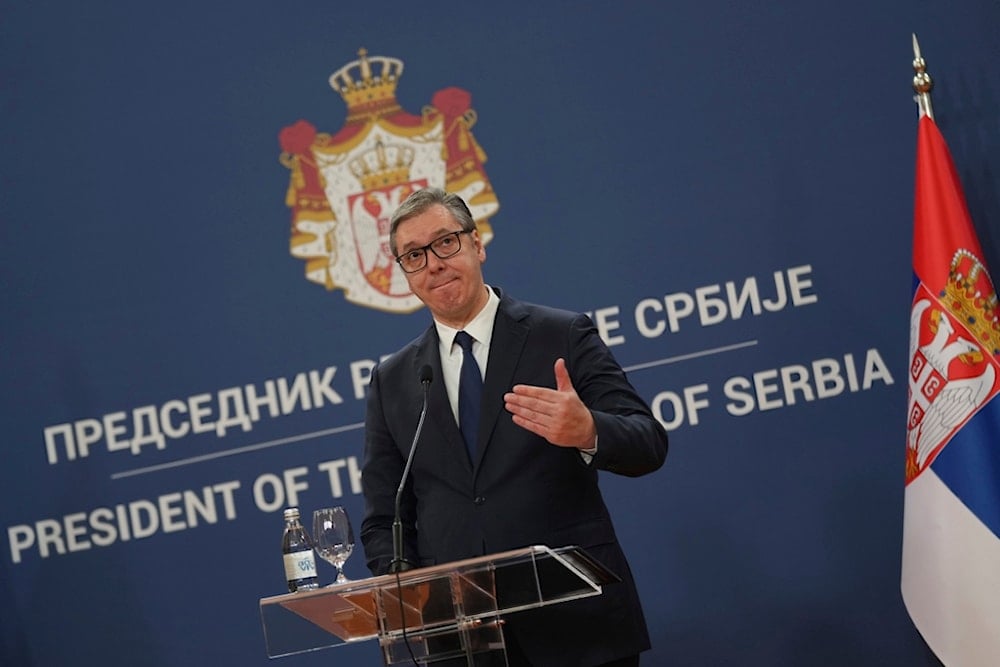Serbia's Vucic dismisses calls for snap elections 'stupid nonsense'
Serbian President Aleksandar Vucic rejected a petition by over 1,500 professors calling for snap elections, dismissing it as "stupid nonsense" amid ongoing protests and political unrest.
-

Serbian President Aleksandar Vucic speaks during a press conference after talks with European Council President Antonio Costa at the Serbia Palace in Belgrade, Serbia, Tuesday, May 13, 2025 (AP)
Serbian President Aleksandar Vucic on Saturday dismissed a petition submitted by over 1,500 university professors calling for snap parliamentary elections, labeling the appeal as “stupid nonsense” and insisting that only authorized officials may decide on election matters.
The petition, dubbed an "academic initiative" by Serbian media, was submitted to the president’s office on Friday but lacked formal signatures or identification details such as passport numbers. Though symbolic, the petition reflects growing academic and civil discontent amid months of anti-government demonstrations.
“There are lots of petitions,” Vucic remarked during a televised statement. “We got four of them yesterday, and one was especially interesting to me. Children from the municipalities of Raska and Sjenica wrote to me about roads in the Golija mountain range. That was far more interesting than the stupid nonsense by unauthorized persons who have no right to make any decisions about this.”
Vucic added that there is no cause for concern, asserting that elections would be held only when necessary and urging citizens to focus on improving wages and pensions.
Ongoing unrest, electoral demands
The demand for early elections has been amplified by student-led protests and opposition movements, particularly in response to the Novi Sad tragedy, a catastrophic rail station collapse last November that killed 16 people. Demonstrations over the incident and wider dissatisfaction with government transparency have continued for over six months.
In early May, student organizations and activists renewed calls for snap parliamentary elections, but were rebuffed by National Assembly Speaker Ana Brnabic, who reiterated that only the president had the authority to initiate such a move.
Since Vucic took office in 2012, Serbia has held six parliamentary elections, five of which were held ahead of schedule. Despite that trend, the current cabinet, led by Prime Minister Duro Macut, was formed without a general election. The administration was approved by parliament on April 16 and remains largely unchanged from the previous cabinet.
The current government was preceded by the resignation of Prime Minister Milos Vucevic, who stepped down in March following his January 28 resignation letter. His departure came amid heightened public anger over the Novi Sad incident, which exposed critical infrastructure failures.
'Color revolution' brewing in Serbia
Deputy Prime Minister Aleksandar Vulin said in March that his country was facing the danger of a "color revolution," accusing Western security agencies of orchestrating unrest to provoke a government overthrow similar to Ukraine's 2014 Maidan coup.
Student-led protests in Serbia, sparked by accusations of corruption and government negligence, have been ongoing for months. The unrest was ignited by the deadly collapse of a concrete canopy at the Novy Sad railway station in November 2024.
The protests escalated with a massive rally in Belgrade on March 15, which resulted in violent clashes between demonstrators and the police.
During a meeting in Moscow with the secretary of the Russian National Security Council on Saturday, Vulin said, “A color revolution is taking place in Belgrade...Western security services are behind the color revolution as they want to put a new government in power."
Serbia stands up to EU demands
Serbia has refused to join the Western sanctions against Moscow over the Ukraine conflict and "never will," according to the deputy prime minister.
Vulin warned that the forces fueling the unrest could soon lead to further “radicalization” of the protests. He added, “Those who organized [the March 15 rally] would like to see a ‘Maidan’ and are working on making that happen,” in a statement to Shoigu.
In turn, Shoigu, a former Russian defense minister, expressed concern about the situation in Serbia. He stated that Russia “cherishes” its relationship with Belgrade, highlighting that the two nations maintain an “open dialogue” and cooperate particularly in countering “color revolutions.”
Vulin thanked the Russian security services for their intelligence-sharing efforts, saying, “They know the danger Serbia is facing. We have very good communication and I am very grateful for that.” Shoigu, in turn, assured that Belgrade can “always rely on Russia’s aid in any issues.”

 4 Min Read
4 Min Read










